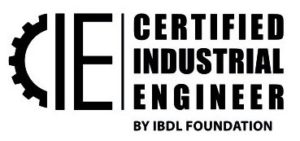
Certified Industrial Engineer (CIE) is an international exam in the field of industrial engineering. CIE is powered by IBDL foundation in collaboration with industrial engineering experts from the United States and the United Kingdom. IBDL gathered the knowledge of the world’s best professional industrial engineers working in the industrial field to come up with the CIE program. IBDL offers its members exclusive access to the CIE Qualification among many other professional certifications.
–
The CIE Objectives:
- Add significant value to organizations by implementing improvements through application of system, process, and management methodologies and tools.
- To provide formal and informal project, administrative and technical leadership.
- Engage in professional growth through post-graduate education, certifications and professional societies.
- To encourage higher educational standards in the Industrial Engineering field.
- To establish an objective measure of an individual’s knowledge and competence in the field of Industrial Engineering.
- To encourage continued professional development by Industrial Engineer.
- The CIE (Certified Industrial Engineer) is the advanced professional certification specifically designed to measure the crucial, technical and management skills making participants better-rounded and employable engineers. Achieving the CIE credential demonstrates your mastery of planning, analysis, control, and decision support.
–
TRAINING STRUCTURE: |
Part 1 = 20 hour
–
PREREQUISITES: |
- Engineering background is recommended
–
COURSE GRADING: |
Attendance 40% Assignments (workshop + project) 60% To pass the course and receive CAD MASTERS certificate you should:
- Attend at least 80% of course hours.
- Score more than 70% as a total score.
Part 1 – Project Management
Summary Description:
- Basic Concepts
- The Project Management Knowledge Areas
- Project Integration Management
- Project Scope Management
- Project Time Management
- Project Cost Management
- Project Quality Management
- Project Human Resource Management
- Project Communication Management
- Project Risk Management
- Project Procurement Management